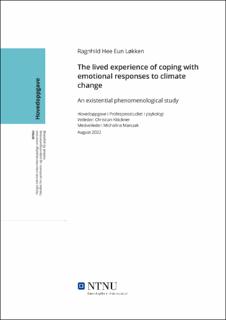| dc.contributor.advisor | Marczak, Michalina | |
| dc.contributor.advisor | Klöckner, Christian | |
| dc.contributor.author | Løkken, Ragnhild Hee Eun | |
| dc.date.accessioned | 2022-12-23T18:19:11Z | |
| dc.date.available | 2022-12-23T18:19:11Z | |
| dc.date.issued | 2022 | |
| dc.identifier | no.ntnu:inspera:104435896:23769374 | |
| dc.identifier.uri | https://hdl.handle.net/11250/3039457 | |
| dc.description.abstract | Klimaendringer utgjør en av de mest alvorlige utfordringene i dag, og det er økende evidens for psykologiske konsekvenser av klimaendringene, inkludert sterke emosjonelle responser til bevissthet om problemet. Dermed er det viktig å utforske hvordan folk håndterer disse emosjonelle responsene. Den nåværende studien ble gjennomført i Norge, med deltakere som identifiserte seg som bekymret for klimaendringene. 33 semistrukturerte intervjuer ble analysert ved hjelp av en deskriptiv empirisk fenomenologisk tilnærming med vekt på eksistensielle temaer. Formålet med studien var å beskrive opplevelser av mestring av emosjonelle responser til klimaendringene, og analysen resulterte i fem overordnete temaer: å akseptere klimaendringenes virkelighet og justere håp og planer deretter, å kanalisere emosjoner til klimahandling, å navigere sosiale dilemmaer og søke forbindelser, å utvikle nye tilnærminger til naturen og livet, og å streve etter balanse i livet. Ved hjelp av en eksistensialistisk fenomenologisk tilnærming gir funnene innsikt i den ofte ambivalente og paradoksale opplevelsen av mestring i konteksten av en global klimakrise som kan sies å fremkalle eksistensielle spørsmål. Funnene indikerer at en mer åpen og inkluderende offentlig debatt og samtale om klimaendringene og emosjonelle responser til klimaendringene, kan bidra til å fremme mestring. Studien oppfordrer til forsiktighet når det kommer til individuelt fokus og ansvar og etterlyser større oppmerksomhet rundt kollektiv handling og sårt tiltrengte samfunnsmessige tiltak.
Nøkkelord: klimaendringer, emosjoner, mestring, fenomenologi, eksistensialisme. | |
| dc.description.abstract | Climate change represents one of the most serious challenges of today and a growing body of evidence documents the psychological impacts of climate change, including strong emotional responses to awareness of the problem. In light of this, it is important to explore how people cope with these emotional responses. The present study was conducted in Norway, with participants who self-identified as concerned about climate change. 33 semi-structured interviews were analysed using a descriptive empirical phenomenological approach with an emphasis on existential concerns. The purpose of the study was to explicate the lived experience of coping with emotional responses to climate change, and the analysis yielded five overarching themes: accepting the reality of climate change and adjusting hopes and plans accordingly, channelling emotions into climate action, navigating social dilemmas and seeking connectedness, developing new approaches to nature and life, and striving for balance in life. Employing an existential phenomenological approach, the findings provide insight into the oftentimes ambivalent and paradoxical experience of coping with a global climate crisis that may be said to bring people in close contact with existential concerns. Moreover, the findings indicate that a more open and inclusive public discussion and discourse about climate change and emotional responses to climate change, may benefit coping. The study encourages caution when it comes to individual level focus and responsibility and calls for more attention to collective action and urgently needed societal measures.
Keywords: climate change, emotions, coping, phenomenology, existentialism. | |
| dc.language | eng | |
| dc.publisher | NTNU | |
| dc.title | The lived experience of coping with emotional responses to climate change: An existential phenomenological study | |
| dc.type | Master thesis | |
